Baby born in hospital basement shelter during strikepublished at 13:40 Greenwich Mean Time
Vitaliy Shevchenko
BBC Monitoring’s Russia editor
 Image source, Mother Child Volyn
Image source, Mother Child Volyn
A baby girl was born in the basement shelter of the Lutsk regional maternity hospital during this morning’s Russian strike.
“The mother and child are feeling well and are now in the ward together with the others,” the regional maternity service says on social media, external.
“A fully fledged maternity room and operating theatre have been set up in the shelter. Staff are able to provide all the necessary assistance to mothers and newborns in safety during air raids,” it says.
The mother had come to Lutsk from the neighbouring Rivne region. Both regions came under Russian attack this morning and are now experiencing electricity shortages as a result.
‘Situation is under control’ – regional governorpublished at 13:25 Greenwich Mean Time
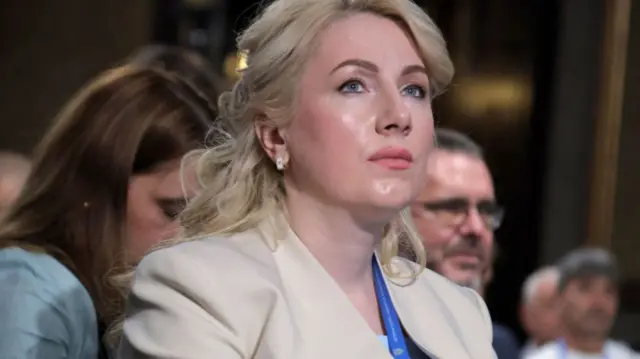 Image source, Getty Images
Image source, Getty Images
As we’ve reported, Ukraine says there are no fatalities in the latest Russian strikes.
Svitlana Onyshchuk, the governor of the Ivano-Frankivsk region in southwest Ukraine, also confirms there were no deaths in her area, although some residential buildings were damaged.
“The situation is under control,” she says in a video post on Telegram.
The governor also mentions that emergency power cuts were implemented after the attacks and that “currently, hourly power outage schedules are in effect”.
She also urges residents to remain vigilant and not ignore air alert signals.
What is Russia’s new Oreshnik missile?published at 13:11 Greenwich Mean Time
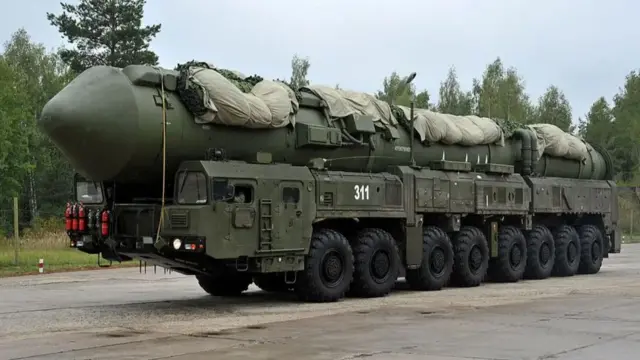 Image source, Getty Images
Image source, Getty Images
Media reports say the Oreshnik could be a scaled-down version of the Yars-M missile, which is an ICBM
President Vladimir Putin has threatened to target Kyiv’s “decision-making centres” with a new ballistic missile.
Questions have been raised about its potential impact and speed after it was used to attack the Ukrainian city of Dnipro last week.
Ukrainian military intelligence initially suggested that the missile wasa new type of intercontinental ballistic missile. Western officials have denied this, saying that such a strike would have triggered a nuclear alert in the US.
Putin described it as a “new conventional intermediate-range” missile with the codename Oreshnik, meaning hazel tree in Russian.
He said the weapon travelled at a speed of Mach 10, or 2.5-3km per second (10 times the speed of sound), claiming that “there are currently no ways of counteracting this weapon”.
If Putin’s description is correct, the missile is at the upper edge of the definition of hypersonic.
Ukraine reports 12 targets hit in Russian strikespublished at 12:57 Greenwich Mean Time
Ukraine’s air force says 12 targets were hit following Russia’s missile and drone attack overnight.
Most of the sites affected were fuel and energy facilities, according to their latest update.
They say about 90% of the cruise missiles launched by Russia were shot down, alongside three guided missiles and 35 drones, with over 60 “lost”.
The air force also says Russia’s use of “thermal and radar traps” and other technological advances makes it challenging for Ukraine to handle large-scale attacks, as it lacks sufficient Western anti-aircraft systems to safeguard its infrastructure.
They also note that the attacks occurred during “dense fog and cloud cover,” which made it more difficult for pilots and crews to respond to the strikes.
Ukraine reports no fatalities in latest Russian strikespublished at 12:41 Greenwich Mean Time
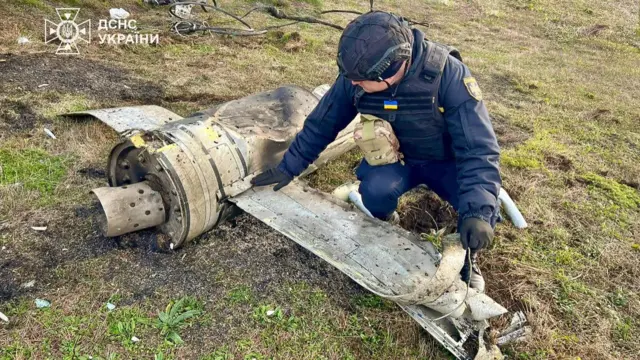 Image source, State Emergency Service of Ukraine
Image source, State Emergency Service of Ukraine
Ukraine’s state emergency services say there were no fatalities following Russia’s overnight attack, although one person was injured in the Odesa region.
More than 320 emergency workers were deployed across 14 regions, according to the service, after attacks in areas including Kyiv, Vinnytsia, Odesa, Volyn, Kharkiv, Ivano-Frankivsk, Chernivtsi, and Sumy.
“Buildings, vehicles, garages, private homes, warehouses, and a multi-storey building in Kharkiv were damaged,” they say.
These images, released by the emergency services, show the aftermath of the attacks.
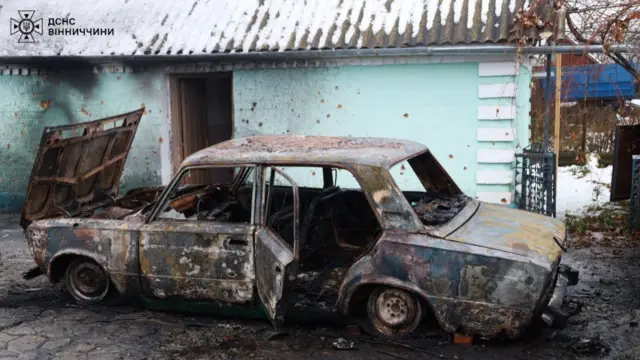 Image source, State Emergency Service of Ukraine
Image source, State Emergency Service of Ukraine
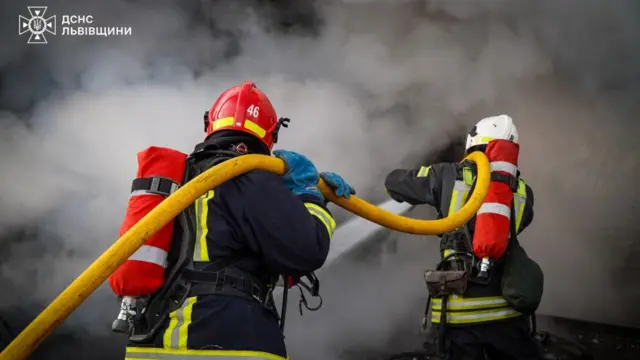 Image source, State Emergency Service of Ukraine
Image source, State Emergency Service of Ukraine
Russia carried out similar attacks before Ukraine used US and UK missilespublished at 12:25 Greenwich Mean Time
Vitaliy Shevchenko
BBC Monitoring’s Russia editor
Vladimir Putin says today’s attack came in response to Ukraine using US and UK missiles against targets in Russia.
But Russia had carried out similar – if not worse – strikes well before Kyiv was granted permission to carry out such attacks earlier in November.
For example, on 26 September Ukraine said it had been attacked with 127 missiles and 109 drones.
Earlier, on 29 December 2023, Ukraine said Russia had used 158 missiles and drones in an overnight attack.
The Kremlin appears to be really worried about Ukrainian attacks with Western missiles, and its message is that they must stop or devastation in Ukraine will continue. The truth, however, is that such devastation is nothing new to Ukraine.
Ukraine ‘begging its masters’ for military equipment, says Putinpublished at 12:14 Greenwich Mean Time
We can bring you a few more lines from Russian President Vladimir Putin’s statement earlier.
He spoke more about Russian arms capabilities, claiming that Ukrainian leaders are “begging their masters for other military equipment”.
“Let no one forget about the Kalibr systems, the Kinzhal and Tsirkon hypersonic missile systems that are in our arsenal, which have no analogues in the world in terms of their characteristics.
“Their production is also being increased, and is in full swing.”
Zelensky speaks to Starmer after latest Russian attackpublished at 11:58 Greenwich Mean Time
Ukraine’s President Volodymyr Zelensky says he’s spoken with UK Prime Minister Sir Keir Starmer about Russia’s overnight attack.
“We discussed the latest act of Russian air terror against Ukraine’s civilian infrastructure,” Zelensky says, adding that “special attention was paid to the issue of further defence co-operation”.
Zelensky expresses his gratitude for the UK’s “large-scale support, in particular for its readiness to allocate at least £3bn annually for the needs of Ukraine”.
The Ukrainian president also mentions that they agreed to “stay in close contact with European leaders” to ensure Ukraine is in a strong position “to face any developments”, including an invitation to join the military alliance, Nato.
Images show destruction following attackspublished at 11:42 Greenwich Mean Time
We’re starting to see images of the destruction after Russia’s overnight attacks in Ukraine.
Below, we can see residents in the outskirts of Odesa, in southern Ukraine, examining damage to their homes.
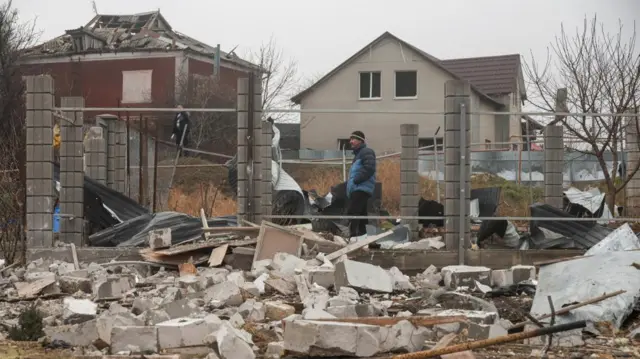 Image source, Reuters
Image source, Reuters
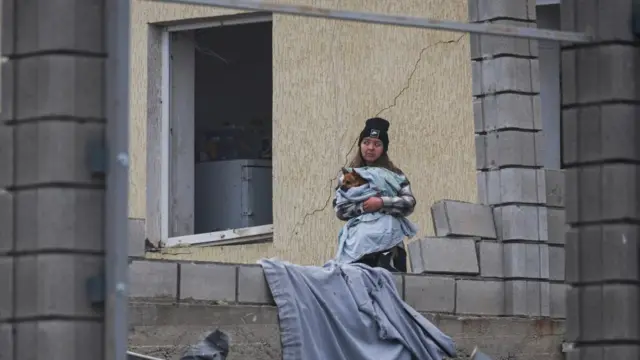 Image source, Reuters
Image source, Reuters
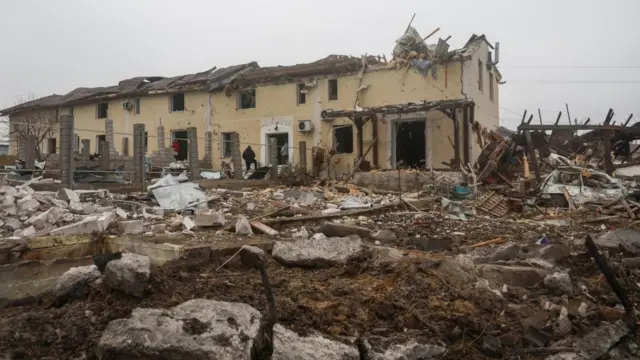 Image source, Reuters
Image source, Reuters
Russia’s attacks aim to sap strength and moralepublished at 11:30 Greenwich Mean Time
Sarah Rainsford
BBC Eastern Europe Correspondent in Warsaw
The missiles and drones are fired to knock out the power to Ukrainian homes and industry, partly to stop the production of ammunition and missiles but primarily to make life miserable for the population at large.
Ukraine has been forced to adapt to these attacks, and businesses and even many houses now have generators that kick in when the mains power is cut.
There are “invincibility points” where you can go to stay warm, get fed and charge your devices. But the point of these strikes is to sap strength and morale, and that is effective.
All the same, I think these strikes do suggest a degree of pressure on Putin himself right now: to end his full-scale invasion soon and claim some kind of win, before it becomes risky for him domestically.
So far, he’s managed to avoid any general mobilisation which would be hugely unpopular.
But tens of thousands of Russian families have lost fathers and sons and Putin has had to recruit North Korean soldiers to fill the ranks.
Putin’s forces are advancing in eastern Ukraine, but they’re still a long way off controlling all the land he long ago declared to be part of Russia.
Now he’s facing rising inflation at home, and a weakening rouble, which means those Russians who’ve managed to keep their heads down and pretend the war next door is not happening, are starting to feel its impact.
That is why Russia’s attacks on civilian infrastructure – which Kyiv denounces as terror tactics – are sure to continue – and likely escalate – as winter really begins to bite.

Putin’s claim of responding to strikes in Russia is deliberately misleadingpublished at 11:21 Greenwich Mean Time
Sarah Rainsford
BBC Eastern Europe Correspondent in Warsaw
This is the second massive strike on Ukraine in a month and it seems Russia is turning up the pressure to try to push home its current military advantage.
It wants to force Ukraine – or get the new Trump administration to force Ukraine – to the negotiating table in the weakest possible position for any talks.
The strikes are meant to send a message of Russian strength and decisiveness: to Washington as well as Kyiv.
So Vladimir Putin’s claim of “responding” to strikes on Russia is deliberately misleading.
It was Russia that launched an unprovoked war on Ukraine, which has the legal right to self-defence.
It’s also important to remember that the last big attack was on 17 November, before Ukraine used any Western-made longer-range missiles against Russia.
Russia’s aim, as always, is to pummel Ukraine into submission.
Russia to continue tests of new missile in response to ‘enemy actions’ – Putinpublished at 10:55 Greenwich Mean Time
Putin also spoke in detail about Russia’s arms production, claiming the country produces 10 times more missiles than all Nato countries, and adding that in 2025 their production of long-range missiles will grow by 25-30%.
The president also said Russia has several other systems similar to Oreshnik – the new ballistic missile it used to attack Ukraine last week – ready for use.
In the event of a massive use of Oreshnik missiles in one strike, its power will be comparable to the use of nuclear weapons, he claimed, adding that they plan to continue combat tests for the missile in response to “enemy actions”.
Putin threatens to target Kyiv ‘decision-making centres’published at 10:50 Greenwich Mean Time
We can bring you some more now from Russian President Vladimir Putin, who spoke for the first time after last night’s strikes, during a visit to a summit in Kazakhstan.
“We carried out a comprehensive strike,” he said, saying that 17 military facilities on Ukrainian territory had been hit.
He said Russia has launched 100 missiles and 466 drones at Ukraine over the past two days.
He added that decision-making centres in Kyiv could become a target for Oreshnik – the new ballistic missile Russia used to attack the Ukrainian city of Dnipro last week.
Putin says attack was in response to strikes on Russia with US and UK weaponspublished at 10:32 Greenwich Mean Time
Breaking
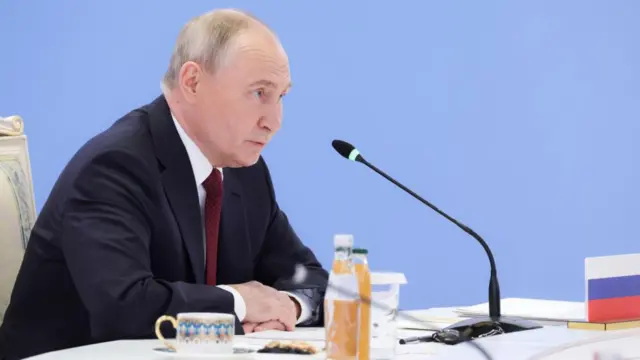 Image source, KREMLIN POOL
Image source, KREMLIN POOL
Russian President Vladimir Putin has said that Russia struck Ukraine with 90 missiles and 100 drones overnight in response to Ukraine’s attacks with UK and US weapons last week.
He said Russia is selecting targets in Ukraine that could include decision-making centres in Kyiv.
Ukraine’s President Volodymyr Zelensky gave the same figures in a statement he made earlier, saying cluster munitions were used specifically against civilian infrastructure.
Ukraine used UK and US weapons to strike Russian territory for the first time last week, which prompted retaliatory strikes from Russia.
Images show aftermath of Russian missile strike in Ukrainepublished at 10:29 Greenwich Mean Time
We’re now getting some of the first images of areas hit by Russia’s overnight strikes in Ukraine.
In the pictures below, firefighters attend the site of a missile strike in Lutsk, Volyn, in the northwest, where we earlier reported blackouts.
About 215,000 people are currently without power in Volyn, according to regional officials.
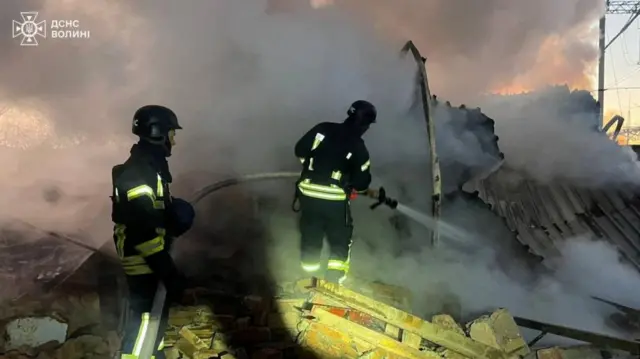 Image source, State Emergency Service of Ukraine
Image source, State Emergency Service of Ukraine
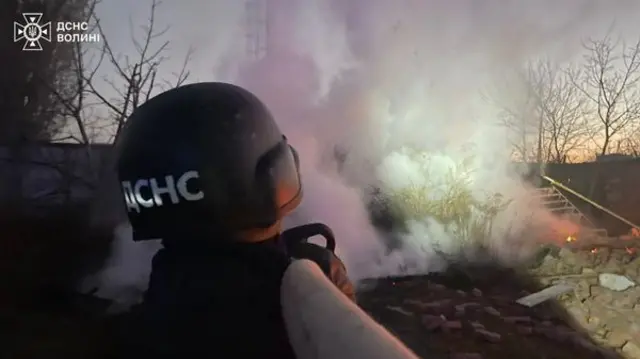 Image source, State Emergency Service of Ukraine
Image source, State Emergency Service of Ukraine
What’s happened so far?published at 10:09 Greenwich Mean Time
 Image source, Reuters
Image source, Reuters
People took shelter overnight inside Kyiv’s metro stations, with many wrapped up in winter gear
If you’re just joining us, or are in need of a recap, here’s what’s happened so far:
- Russia launched a drone and missile attack on Ukraine’s energy infrastructure last night, with explosions heard across the country
- More than one million people are currently without power, as energy suppliers have taken preventative safety measures
- Ukraine’s President Volodymyr Zelensky called it a “vile escalation”, saying cluster munitions had been used
- He says an estimated 100 strike drones and more than 90 missiles of different types were used
- This is the second attack on the country’s energy system this month, writes the BBC’s Paul Adams in Ukraine, as winter approaches
Zelensky says cluster munitions used in attackpublished at 09:48 Greenwich Mean Time
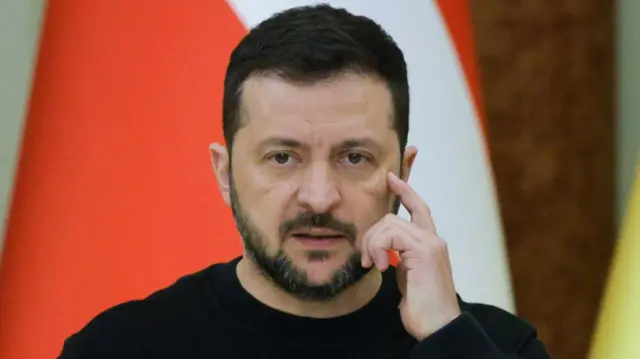 Image source, EPA-EFE/REX/Shutterstock
Image source, EPA-EFE/REX/Shutterstock
Ukraine’s President Volodymyr Zelensky has just made his first comments since Russia’s overnight attack.
“The target is our energy sector,” he says in a post on Telegram, with the attack involving about “about 100 strike drones, more than 90 missiles of different types”.
“In several regions, Kalibr [missiles] with cluster munitions were used specifically against civilian infrastructure.
“These cluster munitions make it significantly more difficult for our rescuers and energy workers to eliminate the impact of the strikes, and this is a vile escalation of Russian terrorist tactics.”
Zelenksy adds that the latest attacks prove the need for Ukraine to have adequate air defence systems.
Ukraine disconnects several nuclear power units – reportpublished at 09:35 Greenwich Mean Time
Ukraine disconnected several nuclear power units from the network amid Russian attacks onenergy infrastructure on Thursday, a Ukrainian energy industry source told Reuters.
Ukraine operates four nuclear power plants with 15 reactors.
Ukraine says Russia launched 188 missiles and dronespublished at 09:21 Greenwich Mean Time
Vitaliy Shevchenko
BBC Monitoring’s Russia editor
While the authorities in Kyiv say all missiles targeting the Ukrainian capital were intercepted, damage is being reported from surrounding areas.
An unnamed “infrastructure facility” has been hit in one location outside Kyiv and “a private house, a non-residential building and a hangar-type structure” in another, the regional administration says, external, adding two people sought medical help.
And in a statement, external, the Ukrainian air force says out of 188 “aerial means of attack” – missiles and drones – launched by Russia, it intercepted 76 Kalibr cruise missiles, three Kh-59/Kh-69 missiles and 35 drones.
“The enemy’s missile and drone attack targeted Ukraine’s energy facilities,” the statement says.
Engineers start repairs after attacks, says energy ministrypublished at 09:09 Greenwich Mean Time
Ukraine’s ministry of energy says engineers are starting to restore energy to areas with power outages, after what authorities say was Russia’s eleventh attack on civilian energy infrastructure this year.
“Power engineers are working to ensure backup power supplies wherever possible,” the ministry says, adding they have “already started restoration work where the security situation allows”.
“Assessment of the extent of damage is ongoing,” it says in a post on Telegram.
We’ve also just received an update on the situation in the Rivne region in western Ukraine, where we earlier reported that power was cut for more than 280,000 people.
“Within the next hour, power engineers will start restoring power supply,” says Oleksandr Koval, head of the Rivne administration, with the first priority on “critical infrastructure”.








